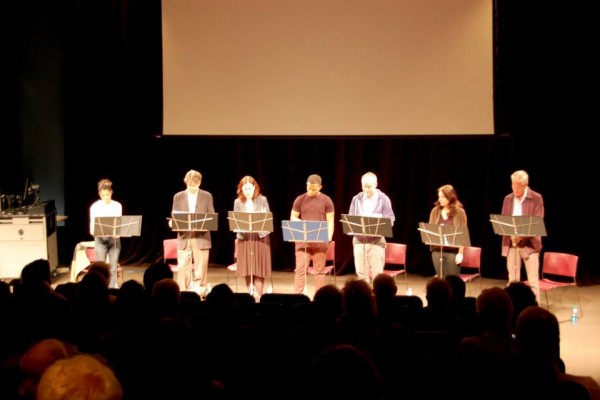‘Full of Grace’ Explores the Journey of LGBT Catholics
November 20, 2014

Homosexuality has always been a sensitive topic within the Roman Catholic Church. On Nov. 24 in Fordham College at Lincoln Center’s (FCLC) Pope Auditorium, the play “Full of Grace: Journeys of LGBT Catholics” will explore this topic, with some untold stories of those within the religion that identify as LGBT. Designed as a docu-drama, the play will share the first-person experiences of over 30 LGBT Catholics ages 19-85 from the United States. The play will be followed by a discussion led by its two third-party producers, Scott Barrow and Robert Choiniere.
The idea for “Full of Grace” began when Bishop Joseph Sullivan of the Diocese of Brooklyn created the Ad Hoc Committee of Gays and Lesbians and their Families in 1999. His goal was to create a welcoming environment for gay individuals and their families in the Roman Catholic community. Realizing that the Catholic Church was not overly accepting of the LGBT community at the time, Sullivan wanted to demonstrate to his congregates that he would break the mold, so to speak, by demonstrating that all were welcome in his parish.
In 2012, Sullivan contacted Robert Choiniere and Scott Barrow to “create a theatrical production based on the faith journeys of LGBT Catholics”, Choiniere said, “with the hope of producing this piece on Catholic college campuses to encourage a dialogue about sexual identity and faith.” Barrow and Choiniere, both accomplished theater professionals, immediately began brainstorming manners in which they could tell the stories of those they came across. With the help of Bishop Sullivan, Scott Barrow and Choiniere created “Full of Grace: Journeys of LGBT Catholics.”
Even after Sullivan passed away in 2013, Choiniere stated that the Ad Hoc Committee continues on with its same mandate. “The entire piece is dedicated to the memory of Bishop Sullivan,” he said.
Carrying on the desire of the Bishop to tell the stories of LGBT Catholics, both Barrow and Choiniere remained true to the original message. “The play will explore themes such as inclusion and exclusion, self-acceptance and shame, integrity, family, relationships and marriage as well as individual experiences of God and Church. These are the untold stories of disciples seeking a place at the table and the fullness of life to which God calls them,” Choiniere said. Barrow added, “This play wrestles with some of the most important issues in a person’s life, their pain, their faith, their God, their sexuality and their intimacy with other people.”
When discussing the culmination of the idea for the piece, Barrow said, “For me, it was not as much of an academic discussion as it was about a real need to understand the people around me. [Such as] family and friends who were really struggling with this issue. [The play was] an opportunity to talk to and interview a lot of people on this subject, which was fascinating. This issue is obviously incredibly important to a lot of people; it has a lot of pain and suffering and friction about the subject, so I had a real need to understand why people who were being marginalized and isolated just didn’t up and leave the faith.”
Although the concept of the play came before Pope Francis’ recent comments pertaining to homosexuality and Catholicism, both Choiniere and Barrow agree that the idea that the Pope of the Catholic religion is merely addressing LGBT individuals shows how far the Catholic Church has come in terms of acceptance and tolerance.
“The concept of the play itself is, I believe, an exercise in the Pope’s overall desire to consider the lived experience of the faithful in our theological discourse. The play itself is a theological reflection on faith and sexuality from some of the most marginalized members of the Church. The Church is now struggling with the disconnect between teaching and lived experience. This play is an opportunity to put these two into dialogue. In that sense, it is perfectly timed with Pope Francis’ thrust to consider the experience of the faithful in any conversation concerning content or implementation of the Church’s teaching. We didn’t know that Synod or even Pope Francis were coming when we started, but it does seem that the timing could not be better.”









